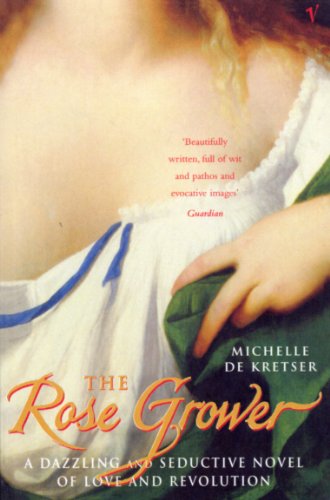Customer Services
Copyright © 2025 Desertcart Holdings Limited


The Rose Grower
F**T
Not as good as her other work
I loved 'The Hamilton Case', also by Michelle de Kerstner. It was a suprise book, as I got it 2nd hand and didn't know what to expect, but it was beautifully written and very good. So I was really looking forward to reading this book but found it very weak in comparison. But this is an earlier book and her writing has obviously developed a lot in the interim. I would also be tempted to say that the author really found her voice when writing about the country she is originally from and its fascinating history and beauty, rather than a somewhat insipid tale of rose growers during the french revolution. This book was enjoyable to read and had flashes of what I loved in her later book, but is no comparison to 'The Hamilton Case'.
H**Y
A bit of a disappointment
This book was a bit of a disappointment. I bought it having read "The Lost Dog", which I thought was brilliant; "The Rose Grower" was ok, but not as good as I'd hoped.
D**S
The War of The Roses?
I have one piece of advice to anyone considering reading this novel: Pray don't bother if you dislike lush, lyrical poetic prose. The reason being is that there's precious little else worth bothering about in the novel. Yes, it is set in southwest France during the years of the French Revolution, which one would think would add suspense and character development to the story. But, really, there is no story, and the characters have little or no depth to them.. The Revolutionary period is just a backdrop to what amounts to, for the most part, a literary still-life. I think this book is something like what Emily Dickinson would have produced had she tried to write a novel. On the one hand, this is a recommendation: Dickinson is one of the greatest, most nuanced poets ever to set pen to paper, but...well, try to imagine what a three hundred page novel by her might look like.The passages that grip the poetically attuned reader as s/he embarks on the novel are stunning:"The Pyrenees are invisible in this fine summer weather; and anyway, they lie over sixty miles to the south. Here, the landscape never loses sight of human proportions. Its contours are varied enough to prevent monotony, gentle enough to avoid grandeur. Its unassuming hilltops afford wide views. It is prodigal with light."Really quite good, isn't it? And so it remains until about halfway through the book when one realises that one is never going to learn anything further about the characters' inner lives than one already knows. It's the familiar case a poetic novelist faces of trying to walk the tightrope between style and substance and, in this case, falling headlong into style.One does, of course, learn a great deal concerning roses and their varieties and methods of cross-pollination and what not as practiced in late Eighteenth Century France. Also, there is a very undeveloped intellectual sub-theme concerning Rousseauism, but it never comes near being brought to fruition.Still, Ms. De Kretser does hit the mark strikingly once in a while, and it's worth the reader's consideration to stop and pause over aperçus such as this one where she takes advantage of the reader's smug prejudice against the naïveté of Rousseau and his followers as she builds up a paragraph and then shoots the whole edifice down with the last sentence:"Among the great redemptive ideas that had revolutionised his century was the belief that everyone had the right to happiness. People were essentially good, and everyone, not just a privileged minority, had the right to profit from life. Stephen believed these things certainly. Think carefully before you dismiss him as wrong or foolish."Though the book doesn't really work as a novel, think carefully before you dismiss it altogether.
H**Y
A Modern Classic
This is a great novel, unexpected in the flow of hackneyed romances which has flooded upon the reading public. Oddly, it reminded me in structure of Fitzgerald's TENDER IS THE NIGHT, opening as it does with an American visiting France, an American whom the reader assumes will have great impact on the story to come. Both these books also feature young women of other-worldy beauty and doctors at the cutting edges of their professions. Yet in both these books, the visiting American is no more than an ancillary character, and the style of the stories diverge from there. THE ROSE GROWER begins in a small town in the French countryside on the day that the Bastille has been stormed in Paris. Of course, with the poor communications of that era, the country folk are unaware of the import of the tearing down of the prison. The book continues through the worst years of the French Revolution, the "Terror" as it popularly was known. The revolutionaries evolve into creatures who rival Hitler and Stalin in their cruelties, though the simpler citizens of the countryside are unaware to this prospective impact in the first flush of anti-Royalist excitement. Ms. de Kretser is a lyrical author, as gifted as any of the other modern greats. Each word she chooses is a gem. She writes with a feeling of stillness, of import, of foreboding. She doesn't waste a single sentence. Her heroine, indeed, does grow roses, in order to earn a bit of extra money to assist her long-impoverished aristocratic family. When Ms. de Kretser describes the flowers, her prose is sensual; one even could say sexual. Yet always, in the background, the tumbrels roll. This book deserves to be read by anyone with an appreciation of the art of the novel.
Trustpilot
2 weeks ago
1 month ago